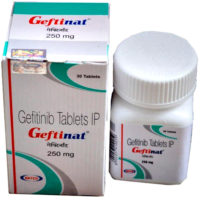Buy Generic Iressa (Gefitinib) from India!
| Active substance | Gifetinib |
| US Brand | Iressa |
| IN Brand | Geftinat |
| Manufacturing by | Natco, India |
| Strength | 250mg |
| Form release | bottle 30 tablets |
| Estimated shipping time | 7 – 18 days (Depending from the Country) |
| Availability, Prices & Order | through request form |
Gefitinib (ZD1839) (INN, /ɡɛˈfɪtᵻnɪb/, trade name Iressa) is a drug used for certain breast, lung and other cancers.
Gefitinib is the first selective inhibitor of epidermal growth factor receptor’s (EGFR) tyrosine kinase domain. Thus gefitinib is an EGFR inhibitor. The target protein (EGFR) is a member of a family of receptors (ErbB) which includes Her1(erb-B1), Her2(erb-B2), Her3(erb-B3) and Her4 (Erb-B4). EGFR is overexpressed in the cells of certain types of human carcinomas – for example in lung and breast cancers. This leads to inappropriate activation of the anti-apoptotic Ras signalling cascade, eventually leading to uncontrolled cell proliferation. Research on gefitinib-sensitive non-small cell lung cancers has shown that a mutation in the EGFR tyrosine kinase domain is responsible for activating anti-apoptotic pathways. These mutations tend to confer increased sensitivity to tyrosine kinase inhibitors such as gefitinib and erlotinib. Of the types of non-small cell lung cancer histologies, adenocarcinoma is the type that most often harbors these mutations. These mutations are more commonly seen in Asians, women, and non-smokers (who also tend to more often have adenocarcinoma).
Gefitinib inhibits EGFR tyrosine kinase by binding to the adenosine triphosphate (ATP)-binding site of the enzyme. Thus the function of the EGFR tyrosine kinase in activating the anti-apoptotic Ras signal transduction cascade is inhibited, and malignant cells are inhibited.
Usual Adult Dose for Non-Small Cell Lung Cancer
250 mg orally once a day
Duration of therapy: Until disease progression or unacceptable toxicity
Comments:
-Information on FDA-approved tests for detection of EGFR mutations in NSCLC: http://www.fda.gov/CompanionDiagnostics
Use: First-line treatment of metastatic non-small cell lung cancer (NSCLC) whose tumors have epidermal growth factor receptor (EGFR) exon 19 deletions or exon 21 (L858R) substitution mutations as detected by an FDA-approved test.
Gefitinib may cause side effects. Tell your doctor if any of these symptoms are severe or do not go away:
- dry skin
- itching
- rash
- acne
- mouth sores
- weakness
Some side effects can be serious. If you experience any of these symptoms, call your doctor immediately or get emergency medical treatment:
- new or worsening shortness of breath, cough, or fever
- severe or ongoing diarrhea
- severe abdominal pain
- loss of appetite
- eye pain, redness, or irritation
- vision changes
- watery eyes
- eye sensitivity to light
- hives
- blisters or peeling skin
- swelling of the eyes, face, lips, tongue, throat, hands, arms, feet, ankles or lower legs
- nausea
- vomiting
- yellowing of the skin or eyes
- dark urine
- pale stools
- pain or discomfort in the right upper stomach area
Gefitinib may cause other side effects. Call your doctor if you have any unusual problems while taking this medication.
